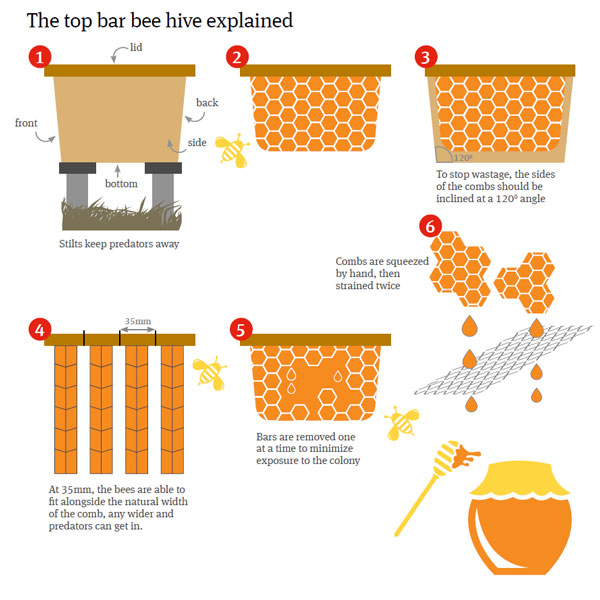Bees are crucial to global agriculture and food supply, and bee keeping presents a growing opportunity for African agricultural development.
Honey is five times more expensive than oil 1
The demand for honey is global, and growing. Not only sought for food consumption, honey is an important raw material in the production of cough medicine, so is bought up by pharmaceutical companies. Honey and wax are also used in cosmetics such as soaps and hair products. Global Industry Analysts Inc. predicts that in 2015 honey production worldwide would have reached 1.9m tonnes. It has been reported that global demand for honey continuously exceeds supply.
In 2015, the honey market globally was projected to hit $12 billion. Pure honey is becoming an expensive commodity – in Kenya a kilogram of honey costs five times more than a litre of petrol, and can be more than double this in Arab markets. In the US, the price of honey is increasing by more than 6% annually.
The value of pollination
Not only do bees produce honey, but their pollination of crops is vital. According to Kevin J. Hackett of the US Department of Agriculture’s Agricultural Research Service, one in every three mouthfuls of food we eat directly or indirectly depends on pollination by bees.2 He cites a Cornell University study which puts the value of bee pollination to US agriculture at more than US$14 billion annually.
For fruit and nut crops, pollination dictates the maximum number of fruits, and is therefore key to increasing yield.
United States bees and African bees
It’s easy to see how the recent phenomenon of bee populations dying off at rapid rates has caused concern with farmers, bee-keepers and environmentalists alike. More prevalent in the United States and Europe than in Africa, the cause is allegedly certain types of insecticides and pesticides used widely in farming. In the US the trend has been named the Colony Collapse Disorder and over the past six years it has wiped out about 10 million beehives worth US $2 billion. In recent years up to a quarter of honeybee colonies have disappeared across Europe.
It’s not clear why the bees in Africa have been less affected. There are arguments that they are resistant to the chemicals responsible for killing bees elsewhere in the world; others argue that the African agricultural environment as a whole has lower amounts of pesticides. Some theories point to the genes of the bees, or that the cause could be the different farm practices in Africa which leave the bees undisturbed. Whatever the cause, there is a growing interest in Africa as the potential future global supplier of honey.
The African story
Ethiopia is the largest producer of honey in Africa and produces approximately 45,300 tonnes annually. Tanzania is the second largest (producing approximately 8,000 tonnes annually), and Kenya ranks third in, followed by Uganda and then Rwanda, with just 4,000 tonnes a year. Production for both domestic consumption and export – much of it to the UAE and other Middle Eastern countries – is a lucrative business.
With more investment in African agriculture, local small-scale production has the potential to go beyond satisfying local demands. Investment will also have a direct benefit on other industries such as the pharmaceutical industry – where pharma companies need to ensure that there is a steady supply of honey to avoid production disruption – and food and cosmetic retail and wholesale companies, as one commodity often has many uses and the supply of honey affects a multitude of markets.
Interestingly, while the importance of investment cannot be underestimated, the development of the honey market in African countries mirrors many other agricultural markets in Africa, where inefficient skills development, knowledge sharing and technological development are hindering growth in the sector, rather than access to finance. This was the view expressed by a number of panellists at an agriculture focused session at the Global African Investment Summit, a two-day event attended by leading politicians and members of the business community in December.
New bee keeping methods have the potential to create a better product which can be sold at a higher price. Sharing access to innovative techniques can create a superior, more marketable, and ultimately more profitable, commodity. The UK charity Practical Action is an organisation that purchases bee hives for low income families in Zimbabwe and advocates the ‘The Kenyan Top Bar Beehive’ technique, which does not disturb the bees and results in a purer honey product. The honey can sell for up to a third more than honey produced by more traditional methods.
Although many countries in Africa have begun local honey production not all producers meet international export standards. Food safety, and related packaging and labelling, was another key issue highlighted at the Global African Investment Summit. Falling short of international standards makes it difficult for producers to compete globally. Meeting international standards should be a focus for development if countries are going to take advantage of the high prices, growing demand and possible reductions in Western supply. The European Commission has stated that the EU will assist developing countries in meeting international standards so that African agricultural products can be increasingly traded on global markets. Experts predict that the honey industry will become a major foreign exchange earner for countries like Zimbabwe, if the honey that is produced meets international standards.

The future of honey and the bees
Many African countries are strategising how to pioneer their entry into, or grow their business in, this lucrative domestic and international market. Bee keeping also has other positive benefits for the local community such as helping families become self-sufficient. It is relatively affordable for local farmers to start up their own business ventures and they can start seeing results within three months.
The challenges to the sector are not unique: knowledge transfer, access to capital, quality control, and logistics. Investment in all these aspects is crucial for this sector to grow sustainably and ensure a thriving bee population which have the potential to supply the globe with honey.





